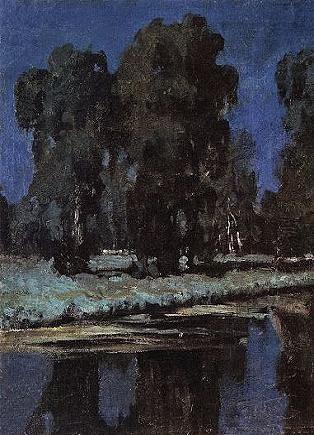Vasily Andreyevic Zhukovsky (1783-1852) was the leading pioneer of
Russian poetry’s golden age. As the natural son of a Russian landowner and a
Turkish captive girl, he was given an appropriate education and,
after tutoring his cousins and joining the militia, became the
most eminent member of the Arzamas circle of poets. He acted as tutor to
the Princess of Prussia, then affianced to the future emperor Nicholas I,
remaining close to court circles and becoming associated with Pushkin
and then with Gogol. In 1841, Zhukovsky retired from court, married a young
German girl, and lived thereafter in Germany.

Many of Zhukovsky’s poems are translations of famous European poems, translations
that can be better than their originals, but the man also became
the leading proponent of Karamzin’s ‘sentimentalism’,
introducing the other-worldly nostalgia of Romanticism into Russia. {1-3}
Zhukovsky became well-known for his 1812 poem ‘The Bard of the Camp of the Russian Warriors’
but his many personal lyrics, where he appears as the Romantic hero of his own verse,
stem from his unhappy love for Maria Protasova, a marriage refused because the girl
(unknown to Zhukovsky) was his own half-sister. For two decades he wrote of an ill-starred love,
and his response to Maria’s death in 1823 is famous.
Though many have British or German prototypes, Zhukovsky’s output is very wide:
solemn epistles, humorous epigrams, ballads and narrative poems, folk tales,
extended stories and epics. From the 1820s, Zhokuvsky was inspired by a religious idealism
far ahead of his age, and to this were added themes of love and art.
In his last poem, ‘The Swan of Tsarkoe Selo’, the swan becomes a symbol of the
soul’s return to ineffable spheres.
Zhukovsky reformed the diction and metre of Russian poetry. Indeed,
he created a new poetical language, in which the originating feelings
have been wholly subsumed by artistic expression, and which, when taken
further by Lermontov, became the model for Russian nineteenth-century verse. {2} (Modernism
has reversed this process of artistic expression, of course, but it is one retained in these translations.)
Ночь
Уже утомившийся день
Склонился в багряные воды,
Темнеют лазурные своды,
Прохладная стелется тень;
И ночь молчаливая мирно
Пошла по дороге эфирной,
И Геспер летит перед ней
С прекрасной звездою своей.
Сойди, о небесная, к нам
С волшебным твоим покрывалом,
С целебным забвенья фиалом,
Дай мира усталым сердцам.
Своим миротворным явленьем,
Своим усыпительным пеньем
Томимую душу тоской,
Как матерь дитя, успокой.
The poem is in amphibrachic metre (ternary: u - u u - u u -) and is rhymed as follows:
Уже́ утоми́вшийся день 3a
Склони́лся в багря́ные во́ды, 3B
Темне́ют лазу́рные сво́ды, 3B
Прохла́дная сте́лется тень; 3a
И ночь молчали́вая ми́рно 3D́
Пошла́ по доро́ге эфи́рной, 3D
И Ге́спер лети́т пе́ред ней 3e
С прекра́сной звездо́ю свое́й. 3e
A TTS (text to speech) recording is:
I'm not a fan of the feminine rhyme in translation, but
we should note Nathan Haskell Dole's rendering on Ruverses. It's a
close and very pleasing version, though tending to over-writing simply through the lack of appropriate feminine rhymes in English:
Already now the weary day
Has through the purple waves descended;
The cooling shades have fast extended;
The azure arch of heaven grows gray!
And solemn Night with peaceful pinions
Comes winging through her vast dominions,
And Hesper with his glittering star
Is herald of her flight afar!
Night
Already now the weary day
towards the purple depths inclines;
the blue above but dimly shines
and then to shadows fades away.
The night assumes its peaceful way
along a quiet path, and day
becomes a wraith-like darkness, led
by glimmering Hesperus ahead.
Heavenly one, come down to us
and have that magic veil impart
your healing of forgetfulness;
give peace to every tired heart.
Bring thus to each tormented soul
the healing balm that makes us whole.
Calm the anguished, tossed and wild
as will a mother with her child.
My English translation is a little free, but aims to render the spirit and beauty of the original. The machine translation is:
Night
Already a tired day
Leaned into the crimson waters,
The azure arches are darkening,
Cool shadow creeps;
And the night is silent peacefully
Went down the ethereal road,
And Hesperus flies in front of her
With its beautiful star.
Come down, O heavenly one, to us
With your magic blanket,
With healing oblivion phial,
Give peace to tired hearts.
By his peacemaking appearance,
With his soporific singing
Tormented soul with longing,
As a mother child, calm down.
1. Wachtel, M. The Cambridge Introduction to Russian Poetry (CUP 2004) 83-5.
2. Mirsky, D.S. A History of Russian Literature (Knopf 1926/Vintage 1958) 75-9.
3. Bristol, E.B. A History of Russian Poetry (O.U.P. 1991) 94-97.
Russian poem translations on this site: listing.